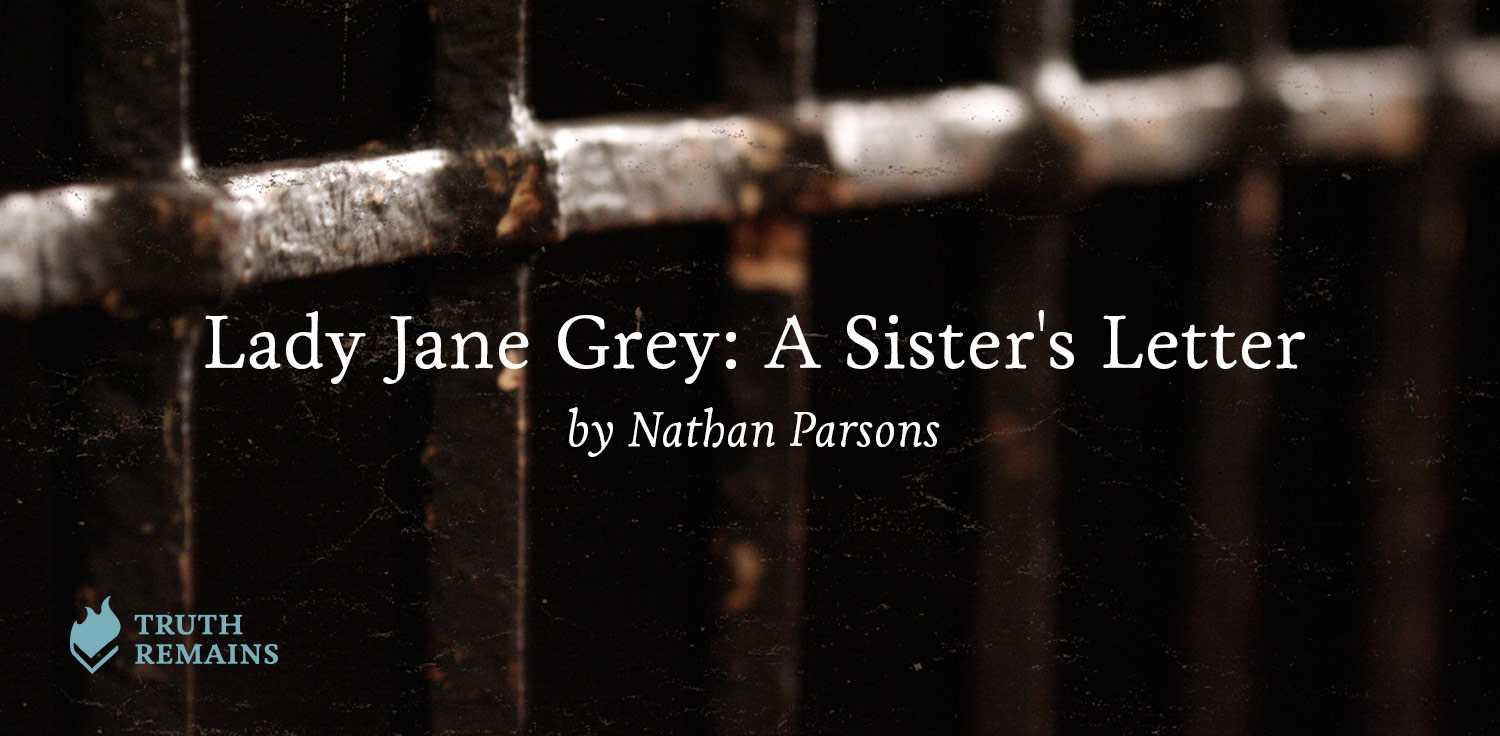Lady Jane Grey: A Sister's Letter
Alone and exhausted, death hovered outside Lady Jane Grey’s prison door, patiently waiting to claim her when the sun rose. This cold February night in the Tower of London would be her last.
With her fate sealed, Jane Grey glanced around her cell, looking for a blank sheet of paper. Nothing. Undeterred, Jane opened up to the back of her Greek New Testament and found a few blank pages.
She had one last letter to write.
Lady Jane Grey
From the moment she was born, Katherine Grey fit neatly into her parents’ royal box. Henry and Frances Grey poured their royal ambitions on their second oldest daughter, with her auburn hair and striking facial features sure to make her stand out in the royal court. Katherine proved to be much more compliant with the wishes of her parents than her older sister, Jane.
Jane Grey represented failure in her parents’ eyes. As Jane’s prospects for marriage into the royal line dwindled, so did their approval. Not nearly as beautiful, Jane had become too opinionated and strong in Protestant character. They placed little value on her acute intellect or their 13-year old daughter’s written correspondence with reformers on the European continent.
The Grey parents’ disappointment in their eldest did not last long, however. Before he died, King Edward VI signed the “Devise for the succession,” a piece of legislation that made sure the royal line skipped his half-sisters, Mary and Elizabeth. To the delight of English Protestants, Edward’s Devise handed the throne to his first cousin once removed, Lady Jane Grey.
With her parents eagerly watching, Jane reluctantly accepted her new title as Queen of England.
Her reign did not last long – a mere nine days, in fact. On August 3rd, 1553, Mary – hell-bent to win England back for Catholicism – triumphantly rode into London and threw Jane into prison. Despite not actively participating in the plot to put herself on the throne, Jane sat in prison for months on end.
The rest of Jane’s family escaped Mary’s wrath, at least temporarily. Katherine actually attended Mary’s coronation and was given a place of honor in the royal court. Jane’s father, a “weak and self-seeking” man,[i] turned back to the Catholic faith, for which the queen issued a general pardon for his part in putting Jane on the throne.
Mary, who did not hold any personal animosity towards cousin, hoped that Jane would follow in her father’s footsteps and renounce her Protestant faith. The queen’s personal chaplain informed the 16-year old that if she recanted and embraced the old religion, she would be granted a full reprieve and escape death.
Jane would have none of it. Her convictions, grounded in her “faith upon God’s word, and not upon the Church,” would not allow it. She would rather die an earthly death than suffer an eternal one.
It is in this context that Jane used a few blank pages in the back of her Greek New Testament to write a letter to her sister. The night before the executioner’s ax ended her life, Jane instructs Katherine to not follow the way of their father and forsake heavenly riches for earthly ones. The true riches, as Jane explains in the opening paragraph, lie in the law of the Lord.
The following is the letter in its entirety, copied verbatim from an 1822 edition of Foxe’s Book of Martyrs. Bold lettering mine, for emphasis.
A Letter written by the Lady Jane at the end of the New Testament in Greek, which she sent to her Sister the Lady Katherine, the night before she suffered.
I have here sent you, (good sister Katherine) a book, which although it be not outwardly trimmed with gold, yet inwardly it is more worth than precious stones. It is the book (dear sister) of the law of the Lord. It is his testament and last will, which he bequeathed unto us wretches; which shall lead you to the path of eternal joy, and, if you with a good mind read it, and with an earnest mind do purpose to follow it, it shall bring you to an immortal and everlasting life. It shall teach you to live, and learn to die. It shall win you more than you should have gained by the possession of your woful father’s lands. For as, if God had prospered him, you should have inherited his lands; so, if you apply diligently this book, seeking to direct your life after it, you shall be an inheritor of such riches, as neither thief shall steal, neither the moths corrupt. Desire with David, good sister, to understand the Law of the Lord.
Live still to die, that you by death may purchase eternal life. And trust not that the tenderness of your age shall lengthen your life; for as soon (if God call) goeth the young as the old, and labour always to learn to die. Defy the world, deny the devil, and despise the flesh, and delight yourself only in the Lord. Be penitent for your sins, and despair not: be strong in faith, and yet presume not: and desire with St. Paul to be dissolved, and to be with Christ, with whom even in death there is life. Be like the good servant, and even at midnight be waking, lest when death cometh and stealeth upon you as a thief in the night, you be, with the evil servant, found sleeping; and lest, for lack of oil, you be found like the five foolish women, and like him that had not on the wedding-garment, and then you be cast out from marriage. Rejoice in Christ, as I do. Follow the steps of your master, Christ, and take up your cross: lay your sins on his back, and always embrace him. And as touching my death, rejoice as I do, (good sister,) that I shall be delivered of this corruption, and put on incorruption.
For am I assured, that I shall for losing of a mortal life, win an immortal life, the which I pray God grant you, and send you of his grace to live in his fear, and to die in the true Christian faith, from the which (in God’s name) I exhort you, that you never swerve neither for hope of life, nor fear of death. For if you will deny his truth for to strengthen out your life, God will deny you, and yet shorten your days. And if you will cleave unto him, he will prolong your days to your comfort and his glory: to which glory, God bring me now, and you hereafter: when it pleaseth him to call you. Fare you well, good sister, and put your only trust in God who only must help you.
[i] Cook, Faith. Lady Jane Grey: Nine Day Queen of England. Darlington: Evangelical Press, 2004. Pg. 206.


